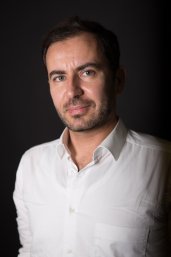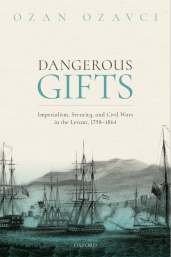Who is talking? An inclusive look at Euro-Middle Eastern history
The absence of the perspective of local actors in historical literature on Western interventionism in the wider Middle East led Ozan Ozavci, Assistant Professor in History, to radically review his research project. Recently, he also called attention to another absence: that of academic staff with a multicultural background.

Having lived and worked in the Netherlands since 2015, Ozan Ozavci noticed a disbalance between the multicultural setup of Dutch society and the absence of a similar multiculturalism in the backgrounds of Utrecht University’s academic staff. In his opinion article in DUB, he pleads for more than just attention for diversity and inclusion: “We ought to bring diversity into the university both physically and mentally by changing not only the scene but also the substance, from top to bottom.”
In other words, faculties should actively promote a more diverse staff, curriculum and reading lists by reconsidering their employment policies as well as the programmes they teach. He notes that there has been a noticeable improvement, and even though it may seem slow, “we must still cling to optimism if we would like to make a genuine change.” In his new book Dangerous Gifts. Imperialism, Security, and Civil Wars in the Levant, 1798-1864, he applies the call for diversity and inclusion to his own research.
Let’s start at the beginning. Ozan, what brought you to explore diversity and inclusion, both as a person and as a scholar?
“Diversity and inclusion are subjects that have occupied my mind for a long time, but especially since I came to the Netherlands in 2015. When I started to work at the campus in Drift, one of the first things I noticed and told my colleagues here was that there were so few people of colour or with a non-Western background in our surroundings. I found it thought-provoking that I was possibly the only non-Dutch person in the International History section back then. It was such a contrast with the situation in France and Great Britain, the two countries I had worked and lived in previously. I found the multicultural staff composition at my universities in those two countries very enriching. It has had an immensely positive impact on my formation as a student and as a scholar.
I must say that I have felt amazed by the Dutch society’s ability to transform itself for the better in relatively short spans of time. An example is the antithetic and more inclusive direction the debate on Black Pete (Zwarte Piet) has taken lately. I guess that raised my expectations on inclusion and diversity at the university. But I have come to realise that the nature of the conversation on diversity has been centred too much on negativity. I think we should never forget the basic kindness that lies at the heart of this entire enterprise of diversity and inclusion, and act accordingly. Inclusion is for everyone. It builds upon mutual respect and empathy.”
Inclusion is for everyone. It builds upon mutual respect and empathy.
Have these experiences changed the way you look at your own research and your role as a researcher?
“Yes, I did sense a correlation between the relative absence of diversity in academic debates and the literature of the subject of my last book, Dangerous Gifts. The book looks into the history of what was termed at the time the Eastern Question, known as the most complex, enduring and dangerous international issue of the long nineteenth century. The Eastern Question was basically about how to deal with the politically and economically precarious situation of those polities located in North Africa, Asia Minor and the Eastern Mediterranean. It sparked what I call a unique culture of security or culture of Western interventionism in the region. The book tells the origins of this story – how it all began. I point out in the book that even though the local actors had been central to the history of the Eastern Question, their voices and agency have been given much less, if any, space in previous analyses. In my work, I looked to introduce a more diverse, multi-perspective analysis which, I like to believe, brings us closer to historical reality and helps us discern its complexity.
In the introduction to the book you write that you started somewhere very different from where you finally landed.
“Indeed. When I started to work on the book as a sub-project of Beatrice de Graaf’s ERC-funded project Securing Europe, Fighting its Enemies, 1815-1914, the initial idea was to write a monograph about the international commission formed by five European commissioners and one Ottoman minister in the aftermath of the 1860 civil war in Syria. But a question I asked myself proved to be a challenge and made me restructure the entire book and my intentions almost half-way through: Why were these European agents invested with such responsibilities in the absence of international institutions like the United Nations? By what right? The more I read about the issue, the more I was triggered by the need to provide a more in-depth analysis and uncover the genealogy of Western interventionism in the Middle East, its self-justificatory nature, and economic and financial undertones. It led me to go further back in history.
I was teaching a course module revolving around the topic of my book. Some of my careful students also immediately noticed the dearth of local perspectives and voices in the literature and my efforts to fill this gap in the lectures.”
How did your students react when you came up with alternative sources and an alternative perception on what they were reading?
“They wondered aloud why they were reading what they were reading but only to realise there was no alternative in the English language. I gave my students assignments so that they would conduct research on issues which I discuss in the book. To name just one example, some of my students wrote an essay on how the Dutch consul Mr. Cutsi was murdered in Damascus in 1860 during the civil war, which was one of the developments that precipitated the Great Powers’ intervention in the civil war in the first place. There was almost nothing about it in the literature. The students had to dig into newspaper archives. They found out that the Dutch consul simply went hiding in a Muslim neighbour’s chimney. So my students have been not only among my first readers, but also active researchers in our humble world of historical discovery. In due course, I shared with them the draft chapters of the book and edited the manuscript as per their suggestions. It was a truly collaborative effort.”

In the book, you describe how the Great Powers assumed that the Ottoman empire was doomed to fall.
“That’s correct. Since the very beginning, major European empires intervened in the Middle East without fully taking into account local complexities. Their vision was usually eclipsed by an ill-defined perception of the Middle Eastern actors as the ‘barbarian other’, as people incapable of self-rule or good governance. They usually failed to see the historical contingencies of local violence and problems, which is very comparable to what has been happening recently, in the twenty-first century, especially since the wars on terror and Iraq were declared. I believe this constitutes a remarkable continuity rather than just coincidental similarities.”
If you see such continuity in the line of thinking throughout the centuries, isn’t it difficult to be hopeful that anything would ever really change?
“I think an extremely difficult situation has been created in the Middle East through the counterproductive agency of both global, mostly Western, and local actors. I can’t think of an easy way out of this. But when there are no visible solutions, the best course of action is to manage the situation and do so in the most humane way. Key here is to bring forth the right sentiments while devising our short- and long-term action plans, and certainly avoiding the past mistakes, that hubris and over-confidence in believing that one can solve local problems by way of external hard power yet with limited acknowledgement of local expectations.
My students wondered aloud why they were reading what they were reading.
It’s all very difficult. We can only hope and work for an alteration in the nature of the culture of interventionism in due course. For now, rather than slipping into our shells, we need to opt for immediate action and help those in need of urgent aid, shelter, and asylum through reliable platforms. There is also a need to learn how not to let war economies and the military/development complex be the net beneficiaries of interventionism. For this, a special responsibility falls on the shoulders of scholars in the humanities and social sciences who can do research into the past and present of interventions, those cultural intersections. Such research would evidently entail using a variety of linguistics skills and accessing complex cultural dynamics. This, I believe, brings us back to what we began with: how important it is to have a diverse and inclusive environment and curricula at the campus.

